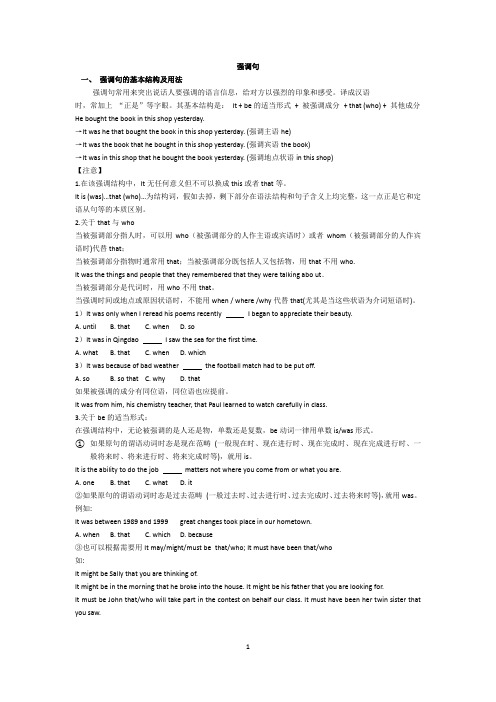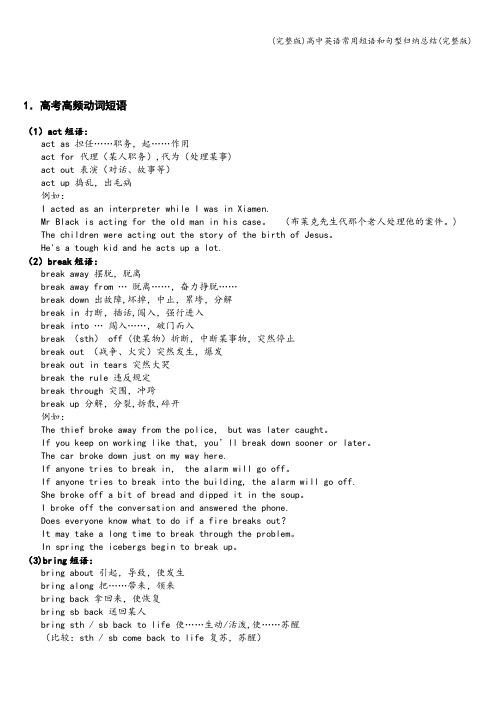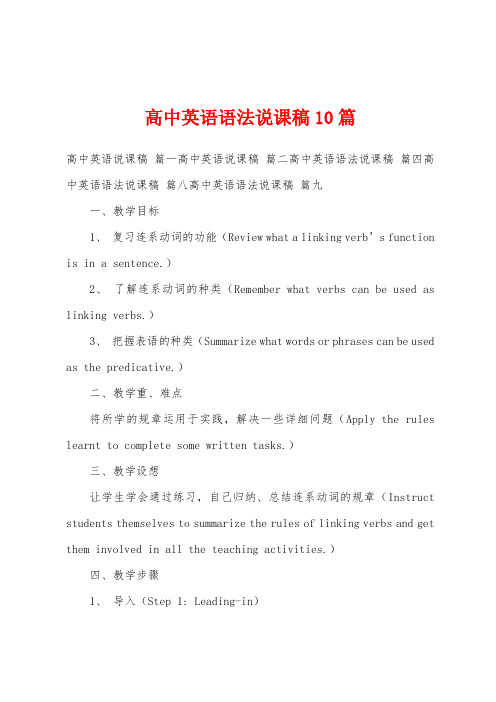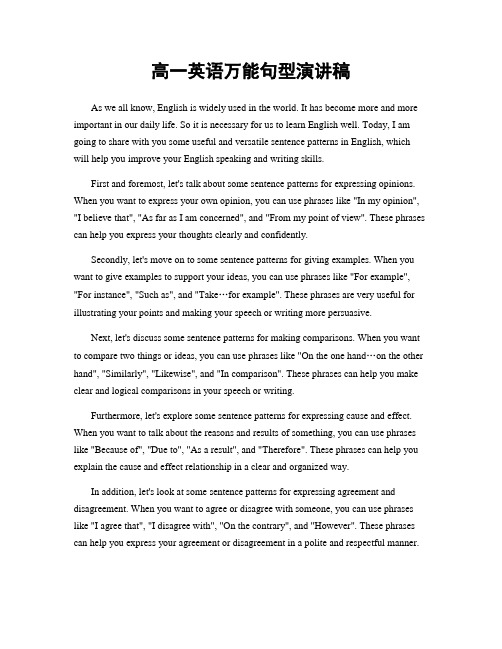最新完整高中英语句型归纳讲课稿
高中英语句子成分基本句型精品课件

5. He│admits│that he was mistaken.
基本句型 四:S V o O (主+谓+间宾+直宾)
有些及物动词可以有两个宾语, e.g.
give/pass/bring/show。这两个宾语通常一个
指人(间接宾语); 一个指物(直接宾语)。 --Give me a cup of tea please. --Show this house to Mr. Smith. --Bring it to me, please.
同等位置时, 一个句子成分用来说明和解释
另一个句子成分, 这个句子成分就叫做它的
同位语。
We students should study hard.
(students是we的同位语, 都是指同一批“学生”)
We all are students.
(all是we的同位语, 都指同样的“我们”)
ห้องสมุดไป่ตู้ 四、独立成分:
谓语: 谓语由动词构成, 是英语时态、语态 变化的主角, 一般在主语之后。不及物动词 (vi.)没有宾语, 形成主谓结构。 如: We come.
S│V(不及物动词)
1. The sun│rose. 2. Who │cares? 3. What he said │does not matter.
4. They │talked for half an hour.
4. He│asked│me│to come back soon.
5. I │saw│them│getting on the bus.
a. S V b. S V P c. S V O d. S V o O e. S V O C
1. Pleas tell us a story. _______ d
(完整版)高中英语强调句型专题讲解

强调句一、强调句的基本结构及用法强调句常用来突出说话人要强调的语言信息,给对方以强烈的印象和感受。
译成汉语时,常加上“正是”等字眼。
其基本结构是:It + be的适当形式+ 被强调成分+ that (who) + 其他成分He bought the book in this shop yesterday.→It was he that bought the book in this shop yesterday. (强调主语he)→It was the book that he bought in this shop yesterday. (强调宾语the book)→It was in this shop that he bought the book yesterday. (强调地点状语in this shop)【注意】1.在该强调结构中,It无任何意义但不可以换成this或者that等。
It is (was)…that (who)…为结构词,假如去掉,剩下部分在语法结构和句子含义上均完整,这一点正是它和定语从句等的本质区别。
2.关于that与who当被强调部分指人时,可以用who(被强调部分的人作主语或宾语时)或者whom(被强调部分的人作宾语时)代替that;当被强调部分指物时通常用that;当被强调部分既包括人又包括物,用that不用who.It was the things and people that they remembered that they were talking abo ut.当被强调部分是代词时,用who不用that。
当强调时间或地点或原因状语时,不能用when / where /why代替that(尤其是当这些状语为介词短语时)。
1)It was only when I reread his poems recently I began to appreciate their beauty.A. untilB. thatC. whenD. so2)It was in Qingdao I saw the sea for the first time.A. whatB. thatC. whenD. which3)It was because of bad weather the football match had to be put off.A. soB. so thatC. whyD. that如果被强调的成分有同位语,同位语也应提前。
(完整版)高中英语常用短语和句型归纳总结(完整版)

1.高考高频动词短语(1)act短语:act as 担任……职务,起……作用act for 代理(某人职务),代为(处理某事)act out 表演(对话、故事等)act up 捣乱,出毛病例如:I acted as an interpreter while I was in Xiamen.Mr Black is acting for the old man in his case。
(布莱克先生代那个老人处理他的案件。
) The children were acting out the story of the birth of Jesus。
He's a tough kid and he acts up a lot.(2)break短语:break away 摆脱,脱离break away from …脱离……,奋力挣脱……break down 出故障,坏掉,中止,累垮,分解break in 打断,插话,闯入,强行进入break into …闯入……,破门而入break (sth) off (使某物)折断,中断某事物,突然停止break out (战争、火灾)突然发生,爆发break out in tears 突然大哭break the rule 违反规定break through 突围,冲跨break up 分解,分裂,拆散,碎开例如:The thief broke away from the police, but was later caught。
If you keep on working like that, you’ll break down sooner or later。
The car broke down just on my way here.If anyone tries to break in, the alarm will go off。
If anyone tries to break into the building, the alarm will go off.She broke off a bit of bread and dipped it in the soup。
高中英语语法说课稿10篇

高中英语语法说课稿10篇高中英语说课稿篇一高中英语说课稿篇二高中英语语法说课稿篇四高中英语语法说课稿篇八高中英语语法说课稿篇九一、教学目标1、复习连系动词的功能(Review what a linking verb’s function is in a sentence.)2、了解连系动词的种类(Remember what verbs can be used as linking verbs.)3、把握表语的种类(Summarize what words or phrases can be used as the predicative.)二、教学重、难点将所学的规章运用于实践,解决一些详细问题(Apply the rules learnt to complete some written tasks.)三、教学设想让学生学会通过练习,自己归纳、总结连系动词的规章(Instruct students themselves to summarize the rules of linking verbs and get them involved in all the teaching activities.)四、教学步骤1、导入(Step 1: Leading-in)Present a short video to get students’ attention on the general idea of linking verbs.2、练习与归纳(Step 2: Explanation and practice:)(1)。
Introduce the definition of a linking verb.(2)。
Get to know the classification of linking verbs.(3)。
Remind students to pay attention to some possible mistakes while using linking verbs.(4)。
(完整版)高中英语人教版必修3重点短语句型

(完整版)⾼中英语⼈教版必修3重点短语句型必修三Unit 1 friendshipImportant expressions & sentences1.be good to sb=be friendly to sb 对sb友好be good at (doing) sth 擅长(做)sth2.add up your score 将你的分数加起来3.go another time 改时间去4.get/have my car repaired 使我的车被修理(别⼈修)5.be upset about sth 为sth苦恼、⼼烦6.calm yourself down 使你⾃⼰镇定下来7.be concerned about sb/sth对sb/sth关⼼、挂念8.as far as I’m concerned 就我⽽⾔9.go on holiday 去度假10.walk the dog 遛狗11.take good care of sb 好好照顾sb12.take exams/classes 参加考试/上课13.cheat in the exam 考试作弊14.should have studied 过去本应该学习(实际没学)15.make a list of 罗列出/doc/233185331cd9ad51f01dc281e53a580216fc500d.htmlugh at sb 嘲笑sb17.go through 经受经历通过花完完成仔细检查18.keep/stay/remain calm 保持镇定19.set down a series of facts 写下⼀系列的事实20.go outdoors 去户外21.on purpose = by design 故意地22.in order(not) to do sth为了(不)做sth23.at dusk 在黄昏24.face to face⾯对⾯地25.no longer = not…any longer 不再26.suffer from loneliness 遭受孤独27.on the highway 在公路上28.recover from illness 从疾病中康复29.get/be tired of (doing) 对(做)sth 厌倦30.pack up my things 将我的东西打包31.go/come back home 回家32.get along/on well with sb 与sb好好相处33.enjoy helping each other 喜欢帮助彼此34.dislike joining in discussions 讨厌加⼊讨论35.fall in love (with sb) 爱上sb36.end the friendship 结束友谊37.ask sb for some advice 征求sb 的意见/doc/233185331cd9ad51f01dc281e53a580216fc500d.htmlmunicate with sb 与sb 交流39.show interests in other people’s ideas 对他⼈的观点感兴趣40.settle down 定居下来1.I am crazy about everything to do with nature.我对⼤⾃然的⼀切感到狂热2.There was a time when a deep blue sky could never have kept me spellbound.曾有⼀段时间蔚蓝的天空不能让我着迷。
高一英语万能句型演讲稿

高一英语万能句型演讲稿As we all know, English is widely used in the world. It has become more and more important in our daily life. So it is necessary for us to learn English well. Today, I am going to share with you some useful and versatile sentence patterns in English, which will help you improve your English speaking and writing skills.First and foremost, let's talk about some sentence patterns for expressing opinions. When you want to express your own opinion, you can use phrases like "In my opinion", "I believe that", "As far as I am concerned", and "From my point of view". These phrases can help you express your thoughts clearly and confidently.Secondly, let's move on to some sentence patterns for giving examples. When you want to give examples to support your ideas, you can use phrases like "For example", "For instance", "Such as", and "Take…for example". These phrases are very useful for illustrating your points and making your speech or writing more persuasive.Next, let's discuss some sentence patterns for making comparisons. When you want to compare two things or ideas, you can use phrases like "On the one hand…on the other hand", "Similarly", "Likewise", and "In comparison". These phrases can help you make clear and logical comparisons in your speech or writing.Furthermore, let's explore some sentence patterns for expressing cause and effect. When you want to talk about the reasons and results of something, you can use phrases like "Because of", "Due to", "As a result", and "Therefore". These phrases can help you explain the cause and effect relationship in a clear and organized way.In addition, let's look at some sentence patterns for expressing agreement and disagreement. When you want to agree or disagree with someone, you can use phrases like "I agree that", "I disagree with", "On the contrary", and "However". These phrases can help you express your agreement or disagreement in a polite and respectful manner.Last but not least, let's go over some sentence patterns for concluding. When you want to conclude your speech or writing, you can use phrases like "In conclusion", "To sum up", "In summary", and "All in all". These phrases can help you summarize your main points and leave a lasting impression on your audience.In conclusion, mastering these versatile sentence patterns will greatly enhance your English communication skills. Whether you are giving a speech, writing an essay, or having a conversation, using these sentence patterns will make your language more expressive and persuasive. So keep practicing and incorporating these sentence patterns into your English learning, and you will see significant improvement in no time. Thank you for listening.。
高中英语课文句型解析教案
高中英语课文句型解析教案第一部分:句型解析一、基本句型1. 主语 + 动词:The dog barks.(狗叫。
)2. 主语 + 动词 + 宾语:She loves him.(她爱他。
)二、并列句型1. 主语 + 动词,主语 + 动词:Mary likes apples, and John likes oranges.(玛丽喜欢苹果,约翰喜欢橙子。
)2. 主语 + 动词,but + 另一个主语 + 动词:She is rich, but he is poor.(她很富有,但是他很贫穷。
)三、复合句型1. 主语 + 动词 + 宾语 + that + 主语 + 动词:He knows that she is angry.(他知道她生气了。
)2. 主语 + 动词 + 宾语 + to + 动词:I want him to come.(我希望他来。
)3. 主语 + 动词 + 宾语 + wh- + 动词:He asked me what I did yesterday.(他问我昨天做了什么。
)四、倒装句型1. 动词 + 主语:Under the tree sat a little girl.(树下坐着一个小女孩。
)2. 助动词或情态动词 + 主语 + 动词:Can you swim?(你会游泳吗?)第二部分:教案1. 教学目标本课主要教授高中英语中常见的句型,帮助学生理解并运用这些句型。
通过对课文中的句型进行解析,提高学生的英语听力和口语能力。
2. 教学过程(1)导入:通过让学生回答一些与已学句型相关的问题,激发学生对句型的兴趣。
(2)句型解析:对以下句型进行详细的讲解和解析,并举例进行说明。
- 基本句型- 并列句型- 复合句型- 倒装句型(3)练习:让学生进行句型转换、填空或造句等练习,巩固所学的句型。
(4)拓展:提供一些额外的使用句型的例句,让学生运用所学句型进行扩展和升华。
(5)总结:对本节课所学的句型进行总结,并检查学生的掌握情况。
高中英语发言稿常用句型
高中英语发言稿常用句型1. Good morning/afternoon, everyone.大家早上/下午好。
2. Today, I would like to talk about.今天,我想谈谈。
3. Firstly, let me introduce myself.首先,让我自我介绍一下。
4. I believe that.我相信。
5. There are several reasons why.有几个理由说明。
6. In my opinion.在我看来。
7. It's important to note that.需要注意的是。
8. According to recent studies.根据最近的研究。
9. Let me illustrate this with an example.让我用一个例子来说明。
10. On one hand, ... On the other hand..一方面,……另一方面。
11. To sum up.总结来说。
12. In conclusion.最后。
13. I would like to emphasize that.我想强调的是。
14. This is a pressing issue that needs our attention.这是一个亟需我们关注的问题。
15. Let's take a closer look at.让我们更仔细地看一下。
16. As we all know.正如我们所知道的。
17. This leads us to the next point.这引出了下一个要点。
18. I urge everyone to.我呼吁大家.19. It’s essential to consider.考虑……是至关重要的。
20. I encourage you all to think about.我鼓励大家考虑。
21. In light of this information.鉴于这些信息。
英语演讲稿句型及范文高中
Introduction:Ladies and gentlemen, esteemed teachers, and fellow students,Good morning/afternoon. It is a great honor to stand before you today to share my thoughts on a topic that is both vital and inspiring: the power of youth and the future we shape. As high school students, we stand at a unique crossroads in our lives, where our actions and choices today will determine the world we live in tomorrow. Let us explore the incredible potential that lies within us and the role we play in shaping the future.Body:1. The Resilience of Youth- "Youth is not a time of life; it is a state of mind."- "The future belongs to those who believe in the beauty of their dreams."- We are often described as the "youthful generation," but what does that truly mean?- Youth is characterized by energy, curiosity, and the ability to dream big. It is a time when we are not bound by the constraints of the past and are free to imagine a world beyond our wildest dreams.2. The Power of Education- "Education is the most powerful weapon which you can use to change the world."- "Knowledge is power, and education is the key to unlock that power."- As high school students, we are at the cusp of acquiring the knowledge and skills that will shape our future.- We have the opportunity to learn from our teachers, mentors, and peers, and to build a strong foundation for our future endeavors.3. The Importance of Social Responsibility- "We are the ones we've been waiting for."- "The world is but a canvas to our imagination."- It is our responsibility as youth to use our voice and take action on issues that matter.- Whether it is climate change, inequality, or social justice, we have the power to create positive change and inspire others to do the same.4. The Role of Innovation and Technology- "Innovation distinguishes between a leader and a follower."- "Technology is the bridge between today and tomorrow."- We live in an era of rapid technological advancement, and as high school students, we are at the forefront of this revolution.- We have the opportunity to innovate, create, and shape the future through the use of technology.5. The Importance of Leadership and Collaboration- "Leadership is not about titles or positions; it is about impact and influence."- "Alone we can do so little; together we can do so much."- As we move forward, we must remember that leadership and collaboration are key to our success.- We must work together, share our ideas, and support one another to achieve our common goals.Conclusion:In conclusion, ladies and gentlemen, esteemed teachers, and fellow students,The power of youth is undeniable. We are the future leaders, innovators, and change-makers of our time. It is our responsibility to embrace theopportunities before us, to use our education and skills to make a positive impact on the world, and to work together to shape the future we all desire.Let us remember that the future is not something that happens to us, but something we create. We have the power to dream, to learn, to lead, and to change the world for the better. Together, we can achieve anything.Thank you for your attention, and let us all strive to be the best versions of ourselves, for the sake of our future and the future of generations to come.[The End]。
高中英语简单句五种基本句型_ PPT课件 图文
We found the great hall full of students and
teachers listening to an important report m__a_d_e__b_y_a__c_o_m_r_a_d_e_ from the People's Daily on
基本句型一:S +V
(主+谓)
基本句型二:S +V +P (主+谓/系+表)
基本句型三:S +V +O (主+谓+宾)
基本句型四: S +V +InO +DO(主+谓+间宾+直宾)
基本句型五: S +V +O +OC(主+谓+宾+宾补)
各种词类及其在句子中的作用:
1. Nouns (n.) 名词:
e.g. We like th.她经常帮她妈妈。
She often helps
2. 我想要一杯茶。
I
want
O her mother. a cup of tea.
基本句型 四
S +V +InO +DO(主+谓+间宾+直宾)
特点:谓语动词必须跟有两个宾语才能表达完 整的意思。这两个宾语一个是动作的直 接承受者,另一个是动作的间接承受者。 通常可改为
S
between about AD 450 and 1150)was very
At.(定语)
V
different from the English(spoken today).
- 1、下载文档前请自行甄别文档内容的完整性,平台不提供额外的编辑、内容补充、找答案等附加服务。
- 2、"仅部分预览"的文档,不可在线预览部分如存在完整性等问题,可反馈申请退款(可完整预览的文档不适用该条件!)。
- 3、如文档侵犯您的权益,请联系客服反馈,我们会尽快为您处理(人工客服工作时间:9:00-18:30)。
高中英语句型归纳1. There is no doing 结构。
其意为“不可能…”、“无法…”:There’s no denying the fact. 这一事实不容否认。
There is no getting over the difficulty. 这困难无法克服。
There is no knowing what he will do next. 无法知道他下一步要干什么。
There was no telling when she would be back。
没法知道她什么时候回来。
2. There is no difficulty in doing sth结构。
意为“做某事没有困难”:There is no difficulty in finding his office. 找到了他的办公室没费一点劲。
There was no difficulty in carrying out the plan. 执行这项计划没什么困难。
3. There’s no doubt of sth. / dong sth / that … 结构。
意为“毫无疑问…”:There is no doubt of his success. 毫无疑问他一定会成功。
There could be no doubt that he was one of the best writer in this country. 毫无疑问他是这个国家最优秀的作家之一。
4. There is no hurry (to do sth) 句式。
其意为“不用急(于做某事)”:There’s no hurry to return the book. 现在不急于还书。
There’s no hurry, so do it slowly an d carefully. 不用赶时间,要慢慢细心地做。
5.There’s no need ( for sb. ) to do sth. …结构。
其意为“不需要或不必要…”:There is no need for help. 不需要帮助。
There is no need for you to go. 你没有必要去。
8. There is no sense in doing sth 结构。
意为“做某事没有道理或好处”:There’s no sense in criticizing him. 批评他也没有用。
There’s no sense in waiting three hours. 等三小时是不没有道理的。
9. There’s no point in doing sth 句式。
意为“做某事没有用”:There’s no point (in) telling her about is. 告诉她没有用。
There’s no point in wasting time. 耗时间没用。
【注】以上有的结构中的no根据情况也可换成其他限定词:There is some difficulty in doing sth意为“做某事有些困难”。
There is much difficulty in doing sth意为“做某事许多困难”。
There’s a need for…意为“需要或有必要…”。
10 prefer(1) prefer to do sth 例:I prefer to stay at home.(2) prefer doing sth 例:I prefer playing in defence.(3) prefer sb to do sth 例:Would you prefer me to stay?(4) prefer to do sth rather than do sth ……宁愿…...而不愿.…".例句:I prefer to stay at home rather than go out(5) prefer doing sth to doing sth 例:I prefer watching football to playing it.(6) prefer sth to sth 例:I prefer tea to coffee. 我要茶不要咖啡。
11. seem(1) It +seems + that从句例:It seemed that everyone was satisfied.(2) It seems to sb that --- 例:It seems to me that she is right.(3) There seems to be ---- 例:There seems to be a heavy rain.(4) It seems as if ---- 例:It seemed that she couldn't come to class.12. 表示“相差……;增加了……;增加到……”句型:(1) She is taller than I by three inches. 她比我高三英寸(2) There is one year between us. 我们之间相差一岁。
(3) She is three years old than I 她比我大三岁。
(4) They have increased the price by 50%. 他们把价格上涨了50%13.too句型:(1) too...to do sth.例:Politics is too important to be left to the politicians.(=Politics is so important that it can't be left to the politicians.)(2) can't … too +形容词无论……也不为过例:We cannot emphasize the importance of protecting our eyes too much.14. 倍数句型:(1)倍数+比较级+than...,例:The room is twice larger than that one.There is 30 times greater chance of being hit by lightening than being attacked by a shark.(2)倍数+as+原级+as...,例:The room is three times as large as that one.(3)倍数+the size /height/length /weight /width of...例:The room is three times the size of that one.15. 感叹句型:(1) What a + Adj + N + S + V!例:What an important thing it is to keep our promise!(2) How + Adj + a + N + V!(多么...!)例:How important a thing it is to keep our promise!(3) How + S + V!例句:How I want to go to Beijing.16.情态动词should ,would, could, might, ought to完成时,表示过去本该做,打算做,想做而未做的事情.should have done =ought to have done 本应该做而没做would have done = 本来就会去做某事而没做could have done = 本可以做某事而没做might have done 本可以做而没做例:They ought to have apologized. 他们本该道歉的。
(1) must have done sth 一定做过某事否定形式:can't / couldn’t have done例:She must have come here last night. She can't have gone there(2) may have done sth 可能做过某事否定形式:may not have done例:Philip may have been hurt seriously in the car accident.(3) might have done sth 或许做过某事否定形式: might not have done例:She might have known what the bottle contained.(4) should have done sth 估计已经做了某事否定形式:should not have done例:She should have arrived in her office by now.17.动词不定式常用句型:(1) It takes / took / will take sb. some time / money to do sth.某人花/花了/将花多长时间/多少钱做某事.例句:It took me years of hard work to speak good English.(2) It is + adj +for/of sb to do sth例:It was careless of Tom to break the cup.(3) Sb. have / has / had no choice but to do... 某人除了做……别无选择.例句:We had no choice but to take a taxi for we'd missed the last bus.(4) It's not /just like sb. to do sth.……的行为不/正像某人的一贯作风.例:lt's not like Jim to be late for class. He regards time as the most important thing in life. (5) …形容词/副词+enough to do sth.例:I was fortunate enough to travel to South Africa..(6) It pays to + V ~~~ (...是值得的。
)例句:It pays to help others.(7) It cost sb some time/money to do sth例:It must cost a good deal to live here.住这儿一定会花很多钱的。
